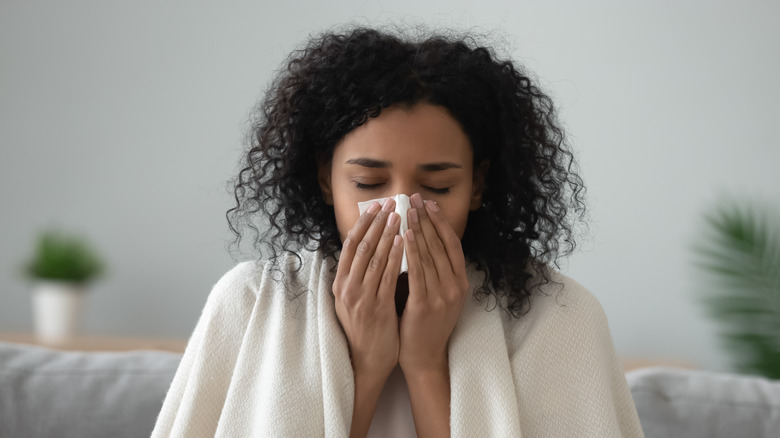Can You Actually Become Sick From Jealousy?
While a positive-vibes-only attitude might sound ideal, it's not always realistic. Life can be challenging, and experiencing difficult emotions is part of being human. But when negative feelings take over your mind, they can take over your physical health, too. "The brain is intimately connected to the body and the body to the brain," Dr. David Spiegel of Stanford University School of Medicine told The New York Times. "The body tends to react to mental stress as if it was a physical stress." That might be why feeling sad can cause fatigue or anxiety can make muscles tense up.
Sometimes, our emotional state might even make us sick. In one 2012 study published in PNAS, researchers found that participants who were under stress were more likely to catch a cold compared to others. As psychologist Dr. Colleen Mullen told Verywell Mind, stress that causes a physical illness may sometimes be a by-product of another suppressed emotion — like jealousy.
But can jealousy really make you sick, or is the green-eyed monster a harmless friend?
The effects of jealousy on the body
Jealousy is a common emotion that, in some cases, can even be beneficial to relationships. As psychiatrist Dr. Leela Magav told PureWow, "Mild jealousy can be healthy ... It reiterates the fact that an individual cares about his or her partner, values them, and does not want to lose them." However, unresolved jealousy that festers over time may eventually wreak havoc on your physical health.
Psych Central explains that jealousy can trigger a faster heart rate, shakiness, and nausea. That queasy stomach can even result in vomiting, clinical psychologist Dr. Joshua Klapow told Elite Daily. This is all due to the body's fight-or-flight response, the same response that kicks in when you're stressed or fearful.
If jealousy is routinely dialing up the body's stress response, that can put you at risk for getting sick more often, as your immune system takes a hit, per Medical News Today. Chronic stress from jealousy could also lead to several other physical health conditions, such as heart disease, diabetes, autoimmune diseases, and infections.
How to ditch the green-eyed monster
For the sake of your health, the green-eyed monster isn't a character you should keep around for long. To manage jealousy, Healthline suggests pinpointing the root cause of your feelings to uncover a hidden need or desire. That can help you make the necessary changes to get what you want. Practicing gratitude for what you already have can be another way to relieve jealousy while also reducing stress.
Psych Central also recommends shifting your mindset by challenging feelings of entitlement and letting go of your attachment to a specific outcome. These shifts can be especially useful when you're feeling envious of someone who has something that you don't.
If, on the other hand, you find that jealousy mostly rears its ugly head in your love life, it could be a sign that you're feeling insecure in your relationship. Dr. Sabrina Romanoff, a clinical psychologist, told Verywell Mind that relationship insecurity can often be curbed by journaling your thoughts, speaking with a therapist, and communicating your concerns with your partner.


